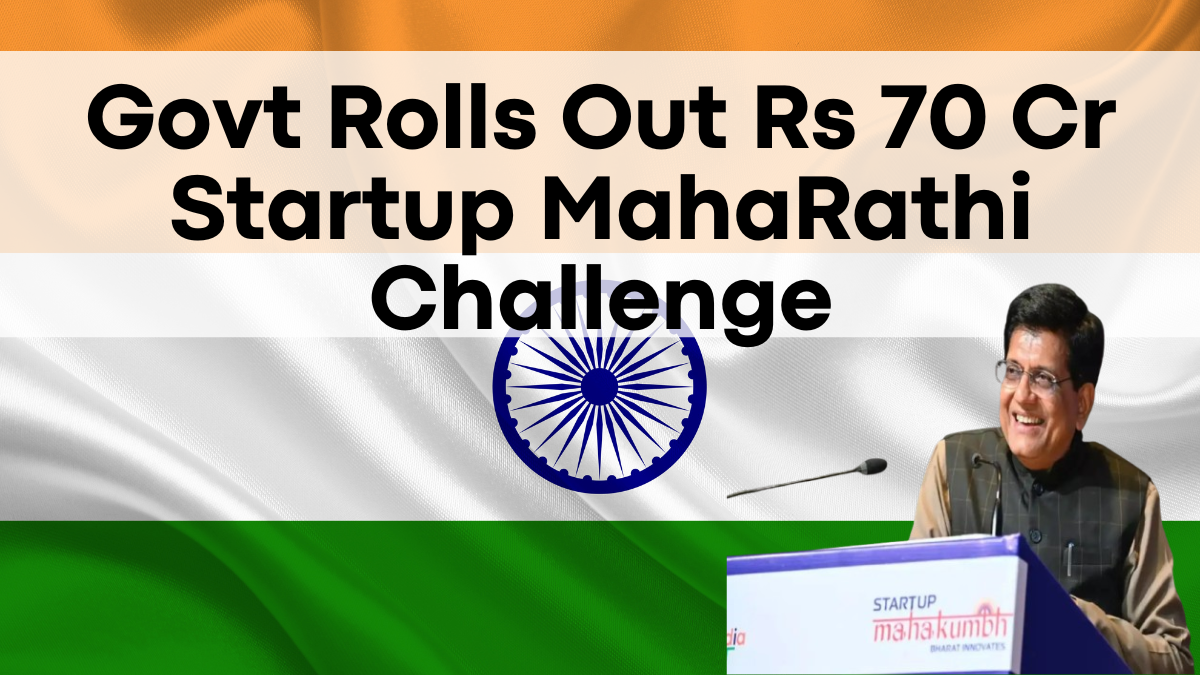The Indian government has launched the Startup MahaRathi Challenge, a major initiative under Startup Mahakumbh 2025, to supercharge the country’s innovation ecosystem. Spearheaded by the Department for Promotion of Industry and Internal Trade (DPIIT), this nationwide competition comes with a staggering ₹70 crore prize pool, making it one of the most substantial startup support efforts to date.
The challenge is designed to accelerate the growth of early to mid-stage startups, particularly in strategic sectors like AI, robotics, biotech, cybersecurity, and climate tech. With financial incentives, mentorship, and national exposure on offer, this initiative aims to put India’s entrepreneurial talent on the global map.
Table of Contents
Govt Rolls Out Rs 70 Cr Startup MahaRathi Challenge

Feature |
Details |
|---|---|
Initiative Name |
Startup MahaRathi Challenge |
Organizing Body |
Department for Promotion of Industry and Internal Trade (DPIIT) |
Event Platform |
Startup Mahakumbh 2025 |
Launch Date |
February 2025 |
Registration Period |
February 26 – March 12, 2025 |
Eligibility |
DPIIT-recognized, early to growth-stage Indian startups |
Prize Pool |
₹70 crore |
Sectors Covered |
AI, Biotech, Robotics, Cybersecurity, Climate Tech, Fintech, etc. |
Official Link |
About the Startup MahaRathi Challenge
Purpose and Scope
-
Part of the second edition of Startup Mahakumbh 2025.
-
Aims to support innovative startups from across India with funding and strategic backing.
-
The challenge will recognize 150 top-performing startups selected for the Grand Jury round in New Delhi.
Goals
-
Identify high-potential startups across emerging tech sectors.
-
Offer funding, visibility, and expert guidance.
-
Foster India’s transition into a global innovation hub.
Eligibility and Registration Process
Who Could Apply
-
DPIIT-recognized startups only.
-
Only early to growth-stage startups were eligible.
-
Applicants needed to be actively operating in India.
Selection Criteria
-
Evaluation based on:
-
Innovation quotient
-
Market potential
-
Sector alignment
-
-
Top 150 startups selected for final live pitching.
Focus Sectors of Innovation
The challenge covers key high-impact sectors driving India’s future economy:
-
Artificial Intelligence (AI)
-
Cybersecurity and DeepTech
-
AgriTech
-
Climate and Sustainability
-
Gaming and SportsTech
-
Financial Technology (Fintech)
-
Biotechnology
-
Robotics and Automation
These areas reflect national priorities in technology, sustainability, and inclusive growth.
Rewards and Incentives
Fiscal Benefits
-
Cash prizes and equity-free grants from the ₹70 crore fund.
-
Corporate credits and technical tools from industry partners.
Non-Fiscal Benefits
-
Mentorship from domain experts (India and globally).
-
Networking opportunities with VCs, corporate leaders, and government officials.
-
Media exposure and brand positioning on a national platform.
Together, these benefits offer both immediate capital and long-term growth support.
Final Jury Round and Pitching Event
Format
-
Live pitching in front of a Grand Jury at Startup Mahakumbh 2025, New Delhi.
-
Startups will be evaluated on:
-
Feasibility
-
Innovation depth
-
Economic and social impact
-
Outcome
-
Winning startups will receive grants, visibility, and access to national startup networks.
-
The event will spotlight India’s most promising innovators and provide a springboard for their next growth phase.
Frequently Asked Questions (FAQs)
Q1: Who can participate in the Startup MahaRathi Challenge?
Only DPIIT-recognized startups in India, operating at early to growth stages, were eligible.
Q2: What sectors does the challenge focus on?
The challenge targets sectors like AI, biotech, climate tech, robotics, fintech, gaming, cybersecurity, and more.
Q3: What kind of support will selected startups receive?
They will receive cash prizes, mentorship, corporate credits, national exposure, and networking opportunities.
Q4: How were startups selected for the Grand Jury round?
Startups were evaluated based on innovation, market readiness, and relevance to key sectors.
Q5: Can non-tech startups apply?
While the challenge emphasized tech-driven sectors, innovation and scalability were key factors, regardless of domain.
Click Here To Know More








